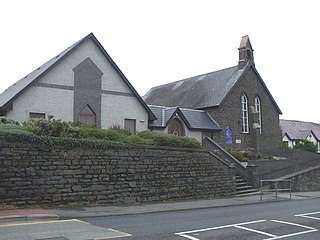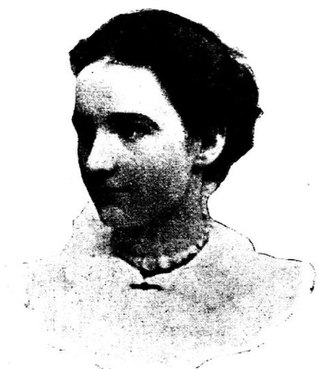
Edward Williams, better known by his bardic name Iolo Morganwg, was a Welsh antiquarian, poet and collector. He was seen as an expert collector of Medieval Welsh literature, but it emerged after his death that he had forged several manuscripts, notably some of the Third Series of Welsh Triads. Even so, he had a lasting impact on Welsh culture, notably in founding the secret society known as the Gorsedd, through which Iolo Morganwg successfully co-opted the 18th-century Eisteddfod revival. The philosophy he spread in his forgeries has had an enormous impact upon neo-Druidism. His bardic name is Welsh for "Iolo of Glamorgan".

Morfydd Llwyn Owen was a Welsh composer, pianist and mezzo-soprano. A prolific composer, as well as a member of influential intellectual circles, she died shortly before her 27th birthday.

Sir John Rhŷs, was a Welsh scholar, fellow of the British Academy, Celticist and the first professor of Celtic at Oxford University.
This article is about the particular significance of the year 2000 to Wales and its people.

Penparcau is a village and electoral ward in Ceredigion, Wales, situated to the south of Aberystwyth.
This article is about the particular significance of the year 1968 to Wales and its people.
This article is about the particular significance of the year 1967 to Wales and its people.
This article is about the particular significance of the year 1953 to Wales and its people.

Patagonian Welsh is a variety of the Welsh language spoken in Y Wladfa, the Welsh settlement in Patagonia, Chubut Province, Argentina. Patagonian Welsh has developed to be a distinct dialect of Welsh, different from the several dialects used in Wales itself; however, the dialects have a high degree of mutual intelligibility, and speakers from Wales and Patagonia are able to communicate readily. Numerous toponyms throughout the Chubut Valley are of Welsh origin.

Eluned Morgan, was a Welsh-language author from Patagonia. She was raised in Y Wladfa, a Welsh colony in Patagonia, and was taught to speak both Welsh and Spanish. Her father eventually enrolled her in Dr Williams' School in Wales, where she had to learn the English language. She led student protests against the school's English-only policy, which prohibited the use of Welsh by its students.
This article is about the particular significance of the year 1917 to Wales and its people.
The Tir na n-Og Awards are a set of annual children's literary awards in Wales from 1976. They are presented by the Books Council of Wales to the best books published during the preceding calendar year in each of three awards categories, one English-language and two Welsh-language. Their purpose is "[to raise] the standard of children's and young people's books and to encourage the buying and reading of good books." There is no restriction to fiction or prose. Each prize is £1,000.
Mary Vaughan Jones was a celebrated Welsh children's author and schoolteacher.
The Pontarddulais Male Choir is a Welsh male voice choir from Pontarddulais near Swansea, Wales. It is the most successful choir in Wales and is internationally renowned having performed in many parts of Europe as well as Canada and the United States.

Thomas Hughes Jones was a Welsh poet and writer from Ceredigion (Cardiganshire) in West Wales. He wrote several collections of stories and contributed to various journals, including Welsh Outlook, throughout his career. In 1940 he won the Literature Medal for his story, "Sgweier Hafila", at the National Eisteddfod. His pen name was generally abbreviated to "T. Hughes Jones".
Edward Prosser Rhys was a Welsh journalist, poet and publisher.
Louie Myfanwy Thomas was a Welsh author best known for her work under the pseudonym Jane Ann Jones.

Sarah Winifred Parry was a Welsh writer most known for developing the modern Welsh short story. She used her nickname Winnie Parry as her pen name. She became a household name with her serialized fiction in periodicals at the turn of the twentieth century. Her most acclaimed work, Sioned, first published as a serial between 1894 and 1896 was introduced as a novel in 1906 and was reissued in 1988 and 2003.
Sioned Nest James was a Welsh musician and conductor, known for founding the successful Cardiff-based choir Côrdydd and contributing to musical programmes on television.
Rhiannon Ifans, FLSW is a Welsh academic specialising in English, Medieval and Welsh literature. She was an Anthony Dyson Fellow at the Centre for Advanced Welsh and Celtic Studies, in University of Wales Trinity St. David. She twice won a Tir na-n-Og prize for her work and won the literary medal competition at the Welsh Eisteddfod, for her 2019 debut novel, Ingrid, which was chosen for the Welsh Literature Exchange Bookshelf. In 2020, Ifans was elected as a Fellow of the Learned Society of Wales.








